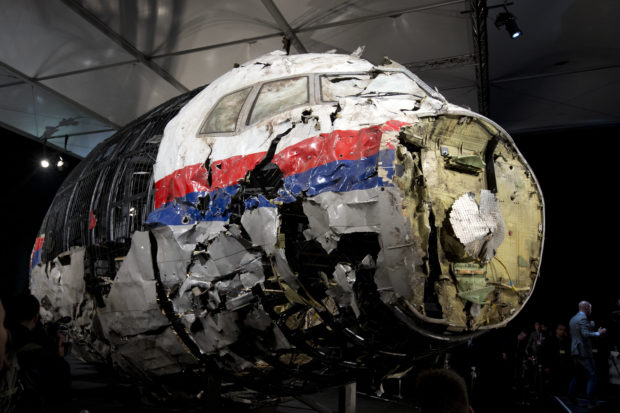Airlines need better info before flying over conflict zones

FILE – This Tuesday, Oct. 13, 2015 file photo, shows the reconstructed wreckage of Malaysia Airlines Flight MH17, put on display during a press conference in Gilze-Rijen, central Netherlands. Malaysia Airlines Flight 17 broke up high over Eastern Ukraine killing all 298 people on board. A Dutch safety watchdog says airlines around the world need more and better information to make risk assessments about flying over conflict zones. The Dutch Safety Board issued a report Thursday Feb. 21, 2019, following up on its publication in 2015 of a probe into the cause of the downing of Malaysia Airlines Flight 17 over war-ravaged eastern Ukraine on July 17, 2014. (AP Photo/Peter Dejong, File)
THE HAGUE, Netherlands — More than four years after a Malaysian passenger jet was shot down over conflict-ravaged eastern Ukraine, airlines around the world still need more and better information to make risk assessments about flying over war zones, a Dutch safety watchdog said Thursday.
The Dutch Safety Board’s comments came in a report following up on its 2015 probe into the cause of the downing of Malaysia Airlines Flight 17 on July 17, 2014, and subsequent recommendations to improve aviation safety and security.
The safety board investigation concluded that the plane was shot down by a Buk missile launched from territory controlled by pro-Russian rebels. All 298 people on board were killed as the plane disintegrated in midair and showered debris over fields in Ukraine.
An international criminal investigation is still underway aimed at bringing the perpetrators to justice. The Netherlands and Australia have said they hold Russia responsible for supplying the missile.
The safety board’s chairman, Tjibbe Joustra, said progress has been made since the downing of MH17 in sharing information about potential risks of flying over conflicts and that airlines are now taking action more quickly.
Article continues after this advertisement“Airlines are taking a more structured approach to analyzing the risks and uncertainties, scaling up to a higher risk level at an earlier stage,” the safety board said.
Article continues after this advertisementNations, international aviation authorities and international organizations such as the European Commission also are working together better to improve intelligence sharing, Joustra said.
But the report stressed that more needs to be done.
“Very few changes relating to airspace management by nations dealing with armed conflict within their territories have been made,” the board said in a statement. “Also, airlines require more detailed and complex information to perform adequate risk assessments.”
Joustra said he saw little action on a recommendation by the board to move quickly on shutting airspaces or imposing altitude limits in the skies above conflict zones.
He said national interests could be preventing such safety actions.
“If you close your airspace, it is a very public admission that you are no longer in charge of your own territory or skies,” Joustra said. / gsg